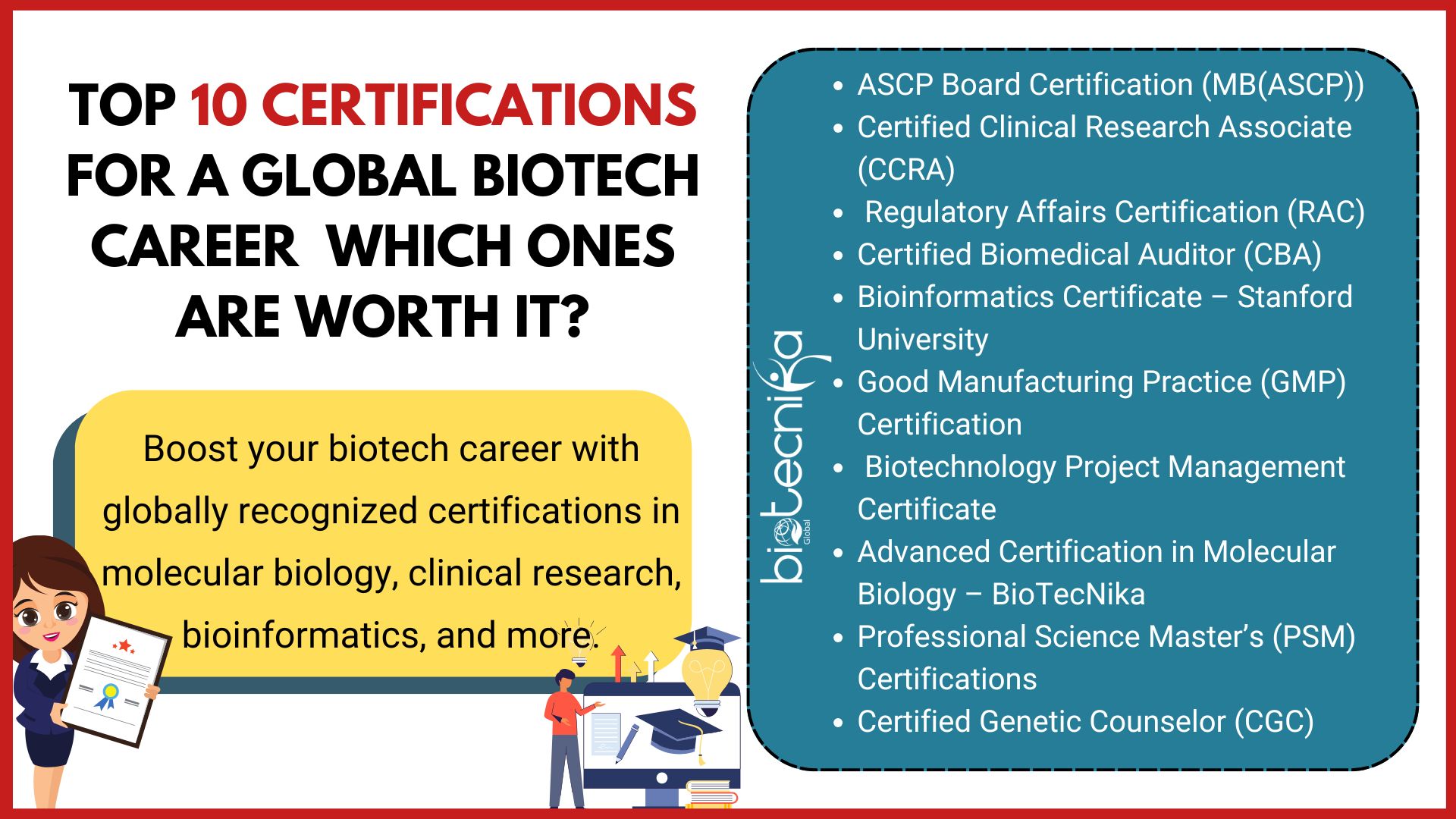Certifications for Global Biotech Career – and Job Opportunities
In the rapidly evolving world of Biotechnology, a degree is no longer sufficient to stand out in the global job market. Recruiters and employers are now actively seeking professionals who have gone the extra mile, those who demonstrate advanced knowledge, specialized skills, and a proactive learning attitude. One of the best ways to showcase such qualities is by earning Certifications for Global Biotech Career.
These certifications not only boost your resume but also equip you with practical insights, industry-standard tools, and global perspectives. Whether you are a student, early-career professional, or experienced scientist, the right certification can open doors to worldwide opportunities.
This article explores the Top 10 Certifications for Global Biotech Career, analyzing their offerings, global relevance, and who should consider them.
1. ASCP Board Certification (Molecular Biology – MB(ASCP))
The American Society for Clinical Pathology (ASCP) is one of the most respected professional organizations for laboratory Science. The Molecular Biology certification focuses specifically on Molecular Biology Techniques, which play a core role in modern diagnostics and research. This Certifications for Global Biotech Career is ideal for those who want to work in hospitals, laboratories, diagnostic centers, and research organisations that rely on precise molecular techniques for testing and analysis.
Why is this ASCP Certification worth it?
- It validates your skills in molecular testing techniques like PCR, electrophoresis, and nucleic acid extraction.
- Recognized in the U.S., Canada, and parts of the Middle East and Asia.
- Increasingly required for roles in hospital labs and biotech companies.
This ASCP Certification is Ideal For:
Clinical lab technologists, molecular biologists, and medical lab scientists.
2. Certified Clinical Research Associate (CCRA) – ACRP
The Association of Clinical Research Professionals provides the certified Clinical Research Associate credential to validate a professional’s expertise in managing and monitoring clinical trials. CCRA is unique because it requires actual work experience in the field before you can apply, ensuring candidates are already grounded in clinical operations.
Why is this CCRA Certification worth it?
- Widely respected across North America, Europe, and Asia.
- Enhances your profile for roles in clinical trials, regulatory affairs, and pharma-sponsored studies.
- Demonstrates adherence to GCP (Good Clinical Practice) guidelines.
This CCRA Certification is Ideal For:
Biotech professionals aiming to enter clinical research or drug development.
3. Regulatory Affairs Certification (RAC)
The Regulatory Affairs Certificate issued by the Regulatory Affairs Professionals Society (RAPS) is considered a gold standard in the regulatory domain. This is one of the most valued credentials in drug, biologic, and medical device regulations. Specialization is available for different regions: RAC (US), RAC (EU), RAC (Global), and RAC (Canada).
Why is this RAC Certification worth it?
- Globally acknowledged, especially in the U.S., EU, and emerging biotech hubs.
- It shows that you understand regulatory frameworks like the FDA, EMA, and ICH guidelines.
- Ideal for career progression into roles like Regulatory Affairs Manager or Compliance Officer.
This RAC Certification is Ideal For:
Biotech professionals interested in global product approvals and regulatory science.
4. Certified Biomedical Auditor (CBA) – ASQ
The American Society for Quality offers the Certified Biomedical Auditor (CBA) credential for professionals responsible for ensuring quality as well as compliance in the biomedical and healthcare industries. This Certifications for Global Biotech Career course trains professionals to adopt biomedical systems and processes.
Why is this CBA Certification worth it?
- Focuses on quality assurance, FDA compliance, and ISO 13485 standards.
- Recognized by top biopharma companies and medical device manufacturers.
- Useful for roles in QA/QC, validation, and regulatory auditing.
This CBA Certification is Ideal For:
Quality assurance analysts, process engineers, and clinical auditors.
5. Bioinformatics Certification – Stanford University (Online)
Stanford University offers a professional certificate in Bioinformatics through its online platform, making it accessible to students and professionals worldwide. The course is well structured and covers essential topics such as sequence alignment, genomic data, analysis, algorithm design, databases such as BLAST and GenBank, and many more tools like Python, R, and Bioconducto.r
Why is this Bioinformatics Certification worth it?
- Taught by experts from one of the world’s top universities.
- Focuses on real-world applications of data science in biotech.
- Widely accepted in global academic and research institutions.
This Bioinformatics Certification is Ideal For:
Students and professionals are pivoting to computational biology or genomics research.
6. Good Manufacturing Practice (GMP) Certification – NSF or WHO
Good Manufacturing Practice (GMP) is a global regulatory framework that ensures products are consistently produced and controlled according to quality standards. GMP certifications can be obtained through recognized bodies, such as NSF International or the World Health Organization. The accreditation involves training in documentation, contamination control, facility cleanliness, personnel hygiene, manufacturing processes, and product traceability.
Why is this GMP Certification worth it?
- Required by law in the pharmaceutical, food, and biotech industries worldwide.
- Ensures you understand how to produce products that meet quality standards.
- Often a mandatory credential for manufacturing and quality roles.
This GMP Certification is Ideal For:
Biotech manufacturing professionals, quality control officers, and process engineers.
7. Biotechnology Project Management Certificate – UC San Diego Extension
The Biotechnology Project Management Certificate, offered by UC San Diego Extension, focuses on project management skills tailored to the Biotech sector. The Biotech industry often works on time-sensitive, high-stakes projects such as drug development, clinical trials, and regulatory submissions. This Certifications for Global Biotech Career Course teaches how to deliver these complex projects efficiently while adhering to scientific and compliance standards.
Why is this Biotechnology Project Management Certification worth it?
- Prepares you for managerial and leadership roles in R&D, clinical trials, or manufacturing.
- Emphasizes tools like Agile and Six Sigma tailored to biotech.
- Adds value to resumes for international project management positions.
This Biotechnology Project Management is Ideal For:
Mid-level professionals seeking project leadership roles.
- Advanced Certification in Molecular Biology Techniques – BioTecNika
Offered by BioTecNika, a prominent life sciences training institute, this certification delivers in-depth theoretical and practical training in essential molecular biology techniques. It covers PCR, RT-PCR, CRISPR-Cas9, electrophoresis, western blotting, DNA/RNA extraction, cloning, and sequencing through virtual simulations and expert-led modules. The program is structured to prepare candidates for real-world laboratory roles by aligning academic learning with current industry standards.
Why is this Advanced Certification in Molecular Biology Techniques worth it?
Highly practical and aligned with current biotech industry demands, it offers mentorship from Ph.D level experts and project-based learning. It is valuable for bridging academic theory with hands-on skills.
This Advanced Certification in Molecular Biology is Ideal For:
Students, researchers, or biotech professionals aiming for lab-based roles in research, diagnostics, pharma, or biotech production.
9. Professional Science Master’s (PSM) Certifications
The Professional Science Master’s program is a graduate-level credential integrating advanced Science education with business, communication, and project management training. Most of the PSM programs offer certifications in Biotechnology, Computational Biology, and Regulatory Science, often in collaboration with industry partners.
Why is this PSM Certification worth it?
- Bridges the gap between laboratory work and corporate biotech strategy.
- Accepted in international firms, NGOs, and research startups.
- Ideal for roles in product management, operations, or market analysis.
This PSM Certification is Ideal For:
Scientists are aiming for non-lab roles without leaving the biotech field.
10. Certified Genetic Counselor (CGC) – ABGC
The certified Genetic Counselor credential is administered by the American Board of Genetic Counselors (ABGC). As personalized medicine and genetics testing become mainstream, certified genetic counselors are in high demand. This Certifications for Global Biotech Career course covers areas such as human genetics, counseling techniques, ethics, risk assessment, inheritance patterns, and communication of genetic risk. While most widely recognized in the U.S, the certification is increasingly valued in Canada, Australia, and parts of Europe and Asia.
Why is this CGC Certification worth it?
- Genetic counseling is a rapidly growing field, thanks to advances in genomics and the increasing availability of consumer DNA testing.
- Certified professionals are sought after by hospitals, biotech startups, and genetic testing companies.
- Required to practice in many parts of the U.S. and recognized internationally.
This CGC Certification is Ideal For:
Biotech professionals working in personalized medicine, genomics, or genetic diagnostics.
How to Choose the Right Certification
Not every certification is right for everyone. When deciding which one to pursue, consider the following:
1. Your Career Stage
- Entry-level: Bioinformatics (Stanford), GMP, or Data Science.
- Mid-career: RAC, CCRA, Project Management.
- Advanced: CBA, CGC, or ASCP Molecular Biology.
2. Your Career Goals
- Research roles: Bioinformatics, Data Science, PSM.
- Regulatory roles: RAC, CCRA, GMP.
- Quality roles: CBA, GMP.
- Clinical roles: ASCP, CGC.
3. Geographic Relevance
Ensure your certification is recognized in the countries where you want to work. For example:
- ASCP and CGC are vital in the U.S.
- GMP and RAC are globally accepted.
- Bioinformatics certifications from Stanford or Johns Hopkins have international weight.
Biotech is no longer limited to laboratory work. As the industry and organisation embrace AI, regulatory scrutiny, personalised medicine, and global supply chains, professionals’ skill sets must keep pace. Getting one or more of these Certifications for Global Biotech Career is more than a resume boost; it is an investment in your global career.
Whether you aim to be a molecular biologist in Berlin, a clinical researcher in Toronto, or a biotech entrepreneur in Singapore, the proper certification can give you the credibility, skills, and global recognition to succeed.







